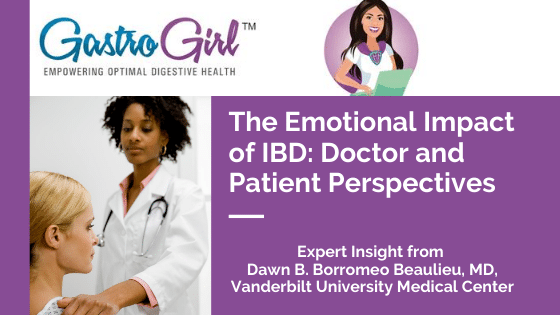The Emotional Impact of IBD: Doctor and Patient Perspectives
If you have inflammatory bowel disease, most of your treatment has likely been focused on caring for your body. But what about caring for your mind?
According to Dawn B. Borromeo Beaulieu, MD, a gastroenterologist at Vanderbilt University Medical Center, there are 5 emotional impacts of IBD that you need to know about:
- Quality of life
- Fear
- Anxiety
- Depression
- Tension
Dr. Beaulieu provided us with her expert insights about the emotional toll IBD can take and has generously shared first-hand experiences and words of wisdom from her patients.
Emotional Impact of IBD: A Doctor’s Perspective
Gastro Girl: Why is it important to discuss the emotional aspects of IBD?
Dr. Beaulieu: There is a substantial emotional impact involved with having IBD. Physical and mental health are both affected with this life-long disease. Physiologic and psychologic stress can be felt during flares and during remission. For patients, it can feel like an uphill climb all the time.
Addressing the emotional impact of IBD is complicated and the patient often requires a multi-disciplinary approach.
GG: What is health-related quality of life?
Dr. Beaulieu: Health-related quality of life is an individual’s or group’s perceived mental and physical health over time.
GG: Thank you for explaining this. Can you tell us how IBD influences health-related quality of life?
Dr. Beaulieu: Jones et al. discusses how IBD impairs health-related quality of life by affecting self-esteem, relationships, nutrition, hygiene and security.1
Impairment of body image, fear of sexual inadequacy, social isolation, fear of dependency, concern about not reaching one’s full potential and fear of stigmatization are all things felt by many IBD patients.1
GG: It sounds like there is much more to IBD than the physical aspects. Our readers with IBD likely share many of the concerns you listed. You included fear of stigmatization on the list, can you tell us more about stigma and IBD?
Dr. Beaulieu: There can be perceived social stigmatization associated with IBD.2
Social stigma is complex and involves one’s own perception of self, internalizing negative behaviors of others, and implementation of these behaviors.
Intestinal symptoms can be detrimental and in some social settings considered as “taboo” to talk about. Having a stoma bag or feelings of being a burden to others can be very stigmatizing.2
IBD can also have an impact on work, with IBD patients more likely to encounter difficulties in finding a job and getting a promotion.2
GG: Anxiety and depression are on your list of the 5 emotional impacts of IBD. Can you speak more about the connection between IBD and anxiety and depression?
Dr. Beaulieu: Chronic diseases such as IBD can trigger negative psychological emotions such as distress and depression. Stress and distress can lead to depression and anxiety disorders.
Bernstein states that over a patient’s lifetime, depression may affect more than 25% and anxiety more than 30% of individuals with IBD. Often stress can be identified as a trigger for IBD flares.3
GG: It sounds like anxiety and depression are a huge concern for those with IBD. Why do you think IBD causes distress?
Dr. Beaulieu: The overall impact of living with IBD can cause tension. Kemp et al. put it well by saying that patients can often feel pushed and pulled in multiple directions. There is constant conflict throughout their lives pushing to feel “normal” and IBD pulls them right back.4
GG: That makes a lot of sense. Do the majority of patients experience some type of emotional impact from their IBD?
Dr. Beaulieu: In a survey study done by Marin-Jimenez et al. on 170 physicians and 903 patients, most patients emphasized the impact of psychological aspects, including anxiety and depression, related to suffering from IBD. And 28% of patients felt that their health professionals were not interested. Both physicians and patients agreed on the need for a psychologist in IBD care teams.5
GG: What do your patients say about the impact of IBD on their emotions?
Dr. Beaulieu: Because of this discrepancy and for multiple other reasons, I wanted to ask my patients what their thoughts were on the emotional impact of IBD on their life. And of course, they said it WAY better than I ever could.
Their strength is continually inspiring. Their struggle often brings me to tears. But always, they move forward and fight. Despite all the emotional impact IBD has on their lives, the one common thread we always talk about is : don’t give up, trust in yourself and your care team, and as my Mother always said when I was young and upset… when things are bad “tomorrow is another day”.
Although this disease will impact all facets of your life, it does not need to control you.
You have the power.
GG: Thank you so much for providing these helpful insights, Dr. Beaulieu. Do you mind sharing some of your patient’s experiences with the emotional aspects of IBD?
Dr. Beaulieu: The following are some insights and words of wisdom from patients. Their names have been changed to protect their privacy but their experiences are raw and real to provide a snapshot of the emotional impact of IBD from the patient’s point of view.
Emotional Impact of IBD: Patient Perspectives
Patient #1: Meghan*
30 YEAR OLD WOMEN WITH SMALL BOWEL FISTULIZING CROHN’S DISEASE WITH HISTORY OF A SMALL BOWEL RESECTION WITH AN ILEOSTOMY ON REMICADE
1. The mental and physical fatigue is real. There are days when you just don’t feel like you have any more to give.
2. You will feel like a burden on your family and friends. Like your illness and need for extra help are too much for them to deal with.
3. Your body image will deteriorate. The feeling like your body is just failing you on all fronts is unimaginably difficult.
4. If you have children, you will feel like you aren’t enough for them. They will become accustomed to Mommy being too tired and sick to play. They come to believe that every time you go to the doctor you are going to be in the hospital for days. This is absolutely heartbreaking.
5. The depression is real. It does not make you weak. There is nothing wrong with seeking therapy or medication for it. Getting help for the mental issues that come along with Crohn’s is just as important as seeking help for the Crohn’s itself.
Patient #2: Mary*
67 YEAR OLD WOMAN DIAGNOSED WITH ULCERATIVE COLITIS IN 2017 FAILED 1 BIOLOGIC AND ON REMICADE
1. Patience: Be patient. There is a treatment plan that will work for you. Find the right doctor.
2. Change in your mindset: Diet is important. I am on the Specific Carbohydrate diet, though it takes a little time to get used to, it has been key for me for maintaining a healthy gut (there are many resources and cookbooks to help).
3. Attitude: Exercise, fresh air and maintaining a grateful attitude are very important.
4. Acceptance: Life will be different, but your new normal does not mean you are limited 5. Beliefs: You can travel and do everything you want to do !
Patient #3: Caroline*
29 YEAR OLD WOMAN WITH SMALL BOWEL FISTULIZING CROHN’S DISEASE WITH A HISTORY OF A SMALL BOWEL RESECTION, FAILED 3 BIOLOGICS AND NOW ON STELARA
1. Don’t give up! It may seem like it will never get better… but it can and it will.
2. A negative mindset helps nothing. It only pushes you deeper and deeper into a depression and that won’t help. Try your hardest to stay positive. Depression, anxiety and stress doesn’t help your disease or symptoms. Honestly, I feel like it always made mine worse. Just breathe and know you can get through this.
3. Always be conscious of the disease and symptoms but don’t let it over-take your life. Don’t be scared to go places and do things, don’t be scared to enjoy life. Just make a plan and map out the bathroom. Keep some extra clothes and bathroom items in the car. It’s ok to be prepared and it’s easier than being unprepared and embarrassed.
4. A lot of people think they are helping when they give you advice, but the truth is unless they have dealt with Crohn’s Disease itself then they really don’t know. Just don’t let others get to you. They don’t know and most won’t understand.
5. Talk to someone. You are not alone and the best thing I ever did was join an online support group. You realize that this isn’t only happening to you. Nine times out of ten it could always be worse.
Patient #4: Claudia*
78 YEAR OLD WOMAN WITH ULCERATIVE COLITIS SINCE 2010 FAILED 1 BIOLOGIC AND ON ENTYVIO
1. Family: Need strong show of love and support from family.
2. Outlook: Limit time you spend reading or watching media reports. Many are untrue or at least misleading.
3. Community: Reach out to friends by phone, Facebook, etc. to help with feelings of isolation.
4. Faith: Trust in God–pray, read his word, watch religious programs.
5. Support: In my case, because of serious health problems, have the support of several wonderful physicians and support staff who truly care about YOU AND YOUR health problems.
Patient #5: Kristie*
39 YEAR OLD WOMAN WITH STRICTURING CROHN’S DISEASE SINCE 2010, WORKING MOM OF 2, ON STELARA
1. Self- worth/Identity: Do not let it define your life, you will adapt and be able to live a new normal life.
2. Frustration: IBD is hard to understand and you may see from others that they find it hard to understand. It helps to talk with someone else who has an autoimmune disorder.
3. Stressful: Find an outlet for your stress. Stress directly correlates with my symptoms
4. Discouraging: Take your medication, preventing flare ups is way more productive than trying to contain them after the fact.
5. Uncomfortable: My heating pad is my friend, find out what helps your symptoms when they do occur. Because they will occur and knowing what relieves the best for you will help.
Patient #6: Sheila*
32 YEAR OLD WOMEN WITH ULCERATIVE COLITIS ON LIALDA
1. Denial and Loss: There may be a period of denial after receiving an IBD diagnosis and feeling of uncertainty of what life will look like moving forward with having a chronic illness. A sense of loss may occur where the patient has to accept the diagnosis, course of treatment, and challenges that IBD may cause for their future and changes that having a chronic illness will play in their life.
2. Anxiety: Patients may experience anxiety in regard to the location/availability of restrooms while in public, fear of incontinence and financial burdens of medications, treatments and surgeries. Additional adjustments or accommodations for social and work situations may need to be considered which could cause additional anxiety.
3. Fear: IBD can cause a sense of fear of the unknown, as changes in medications, additional treatment options and surgeries may become a reality in the future. Fear associated with IBD and having to plan for unknown circumstances, i.e. emergency change of clothes, restroom access, hospital visits, etc. can become a huge burden without the right support.
4. Burden: Patients may feel their IBD diagnosis is a burden to their family, friends, etc. as they may require extra assistance and accommodations. Since IBD is a chronic illness and is often referred to as an “invisible” disease, it is often hard for “outsiders” to see the physical and mental effects that IBD patients deal with daily. It can also become overwhelming to educate and explain to others what IBD means.
5. Relief: Patients may feel relief once a diagnosis is received and a course of treatment is determined. Patients can reach out to their healthcare provider to discuss ways to get more information about IBD and how they can utilize resources like the Crohn’s and Colitis Foundation and local support groups to help educate themselves and gain a sense of community.
*All patient names are fabricated to protect patient privacy.
References
- Jones JL, Nguyen GC, Benchimol EI, et al. The Impact of Inflammatory Bowel Disease in Canada 2018: Quality of Life. J Can Assoc Gastroenterol. 2019;2(Suppl 1):S42-S48. doi:10.1093/jcag/gwy048
- Lenti MV, Cococcia S, Ghorayeb J, Di Sabatino A, Selinger CP. Stigmatisation and resilience in inflammatory bowel disease. Intern Emerg Med. 2020;15(2):211-223. doi:10.1007/s11739-019-02268-0
- Bernstein CN. Psychological Stress and Depression: Risk Factors for IBD?. Dig Dis. 2016;34(1-2):58-63. doi:10.1159/000442929
- Kemp K, Griffiths J, Lovell K. Understanding the health and social care needs of people living with IBD: a meta-synthesis of the evidence. World J Gastroenterol. 2012;18(43):6240-6249. doi:10.3748/wjg.v18.i43.6240
- Marín-Jiménez I, Gobbo Montoya M, Panadero A, et al. Management of the Psychological Impact of Inflammatory Bowel Disease: Perspective of Doctors and Patients-The ENMENTE Project. Inflamm Bowel Dis. 2017;23(9):1492-1498. doi:10.1097/MIB.0000000000001205
Katelyn Collins, RD is a registered dietitian and health writer specializing in digestive health. Katelyn’s personal experience with a digestive condition first sparked her passion for nutrition and health. Since then, she has been a vocal advocate for the digestive health community and has dedicated her own nutrition practice to serving those with digestive conditions.
Listen to our
latest Podcast!








